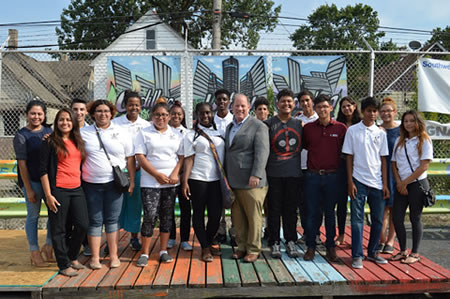The team at the University of Michigan’s Youth Policy Lab (YPL) is hard at work on exciting new projects to support Michigan’s low-income youth.
The Lab is a partnership between the Ford School and the Survey Research Center at the Institute for Social Research. Co-directed by Professors Brian Jacob and Robin Tepper Jacob, the Lab advances the work of nonprofits, agencies, policymakers, and philanthropists by working collaboratively to help those partners make decisions based on best practices, applied research, and real-time feedback on program impact. Current projects range from investigating low take-up of home visiting programs by Medicaid eligible women to working to increase college completion rates in Detroit.
And, for the past year, the Lab has teamed with Connect Detroit and the Detroit Employment Solutions Corporation to evaluate a program called Grow Detroit’s Young Talent (GDYT), the City’s summer employment program for youths aged 14-24.
Cities across the country have promoted and sponsored summer youth employment programs for decades, arguing that these programs will reduce juvenile crime, increase academic success, and enhance job opportunities for the young people who participate.
GDYT was founded eight years ago by the Detroit Youth Employment Consortium (DYEC) in an effort to advance Detroit youths’ educational and career development through increased access to quality employment opportunities. In 2017 alone, over 15,000 young people applied to the program. GDYT was able to hire and subsidize positions for 5,200 youths, and affiliated companies hired another 1,923 into fully-funded positions.
 |
So where does the Youth Policy Lab come in? The YPL team has been providing technical assistance to GDYT, helping the program’s leadership use existing administrative data to better understand the demographics and circumstances of the young people who applied and participated.
After a year of extensively analyzing data from 2015–2017 GDYT participants, the Youth Policy Lab team is ready to release initial findings—and the results are encouraging. Brian Jacob says that the analysis “shows positive outcomes for GDYT participants, including declining absentee rates and increasing graduation rates.” Perhaps most compelling is the finding that program participants were found to be 5 percentage points more likely to graduate high school within two years of participation than were applicants who weren’t selected for the program.
A full policy brief detailing these initial outcomes will be available on the YPL website on April 26.
These initial results are exciting, and U-M is committed to further developing research around projects like these, so that summer youth employment programs play an integral role in the national conversation about workforce development policy.
 |
In 2016, the Youth Policy Lab partnered with University of Michigan Poverty Solutions and the Ginsberg Center to launch the on-campus Summer Youth Employment Project at U-M. The on-campus program is part of Washtenaw County’s Summer Youth Job Program, which includes support from 26 employers across the county.
The program is one of the first of its kind to be directly conducted by a major university, and is unique because impact and best practice evaluations were built in from the start.
In summer 2017, the first group of program participants were matched with summer jobs in various departments across U-M, and also took part in weekly enrichment sessions designed to prepare them for future career opportunities.
Says Jacob of the initiative: “It is exciting to see a program like this grow and evolve here in our own community. We’re working with Poverty Solutions to track the outcomes for the young people who participate, and our goal is to improve service delivery and program design through our data analytics.” The program will continue in summer of 2018.
To stay up to date on the projects taking place at the U-M youth Policy lab, visit youthpolicylab.umich.edu and sign up for the newsletter, follow on Twitter at @youthPolicylab. you can also contact them directly with questions or comments at [email protected] or 734-615-2321.
--Story by Anna Zinkel
Below is a formatted version of this article from State & Hill, the magazine of the Ford School. View the entire Spring 2018 State & Hill.